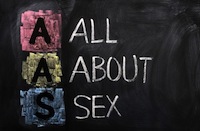Mmmmmmm … “Sex Ed in NZ”. It’s a part of the school curriculum but when do our kids start to learn the nitty gritty about the birds and the bees?
First things first. Sex education is only one part of what is officially termed Sexuality Education in the curriculum. Sex education covers only the physical aspect of sexuality education.
Sexuality education is delivered as a programme within the Health and Physical Well Being subject; one of the seven core subjects delivered in schools.
What is sexuality education?
Sexuality education aims to provide children with the knowledge, understanding and skills to:
“…develop positive attitudes towards sexuality, to take care of their sexual health, and to enhance their interpersonal relationships, now and in the future.”
Many parents are under the misconception that sexuality education teaches only the ‘birds and the bees’, about periods, sexual intercourse and erections and all the ‘scary-to-discuss-stuff’. This is far from the case. Rather the Sexuality Education program covers all aspects of health promotion and allows children to learn about their entire wellbeing – the physical, social, mental and emotional aspects as well.
In parent speak, children will be encouraged through the levels to learn about and examine things like
- gender roles in the community,
- cultural differences that shape people and communities,
- concepts of body image,
- discrimination,
- and the law.
What does sexuality education give our kids a chance to develop?
Often the messages our children learn about the above things comes from family, peers, the media (songs, videos, magazines and so on) and often these messages don’t add up; the conflict in one way or another.
Sexuality education, as a part of the Health and Wellbeing curriculum, gives them a chance to explore all these messages and examine them in their own way. This in turn gives them a chance to develop healthy ideas and opinions about their own well being and sexuality in a safe environment.
Sexuality education in schools provides students with opportunities to develop:- knowledge, understandings, and skills relating to sexual development – physical, emotional, and social;
- knowledge, understandings, and skills to enhance their sexual and reproductive health, for example
- knowledge about the process of conception and the skills to make decisions that maintain and enhance
- personal and interpersonal skills and related attitudes, including
- the skills needed to examine people’s attitudes, values, and beliefs and their rights and responsibilities
- attitudes of respect for themselves and other people
- attitudes of care and concern for themselves and other people
- effective communication skills
- problem-solving and decision-making skills;
- understandings and skills to enhance relationships, for example, in relation to friendship, love, families, and parenting
How will I know when sexuality education is about to happen?
It is necessary for the school to inform parents that sexuality education is the focus of learning at any given time. It is common for a school to inform parents via a newsletter and to invite parents/caregivers to an information evening. In this meeting you as a parent should be informed of what your child will be taught at the level he or she is at. These should also be a chance for you to ask any questions you may have.
Can I object to my child taking part in Sexuality education?
You are well within your rights as a parent to object to your child attending sexuality education at school. You may have cultural or religious convictions which mean you may take this option. If this is the case then you need to let the school know. They will then make plans to provide alternative education for your child during this time.
To find out more about how you can tackle the tough questions or comments at home read
Sex Education – An Introduction
and
Sex Education – The Practicalities


